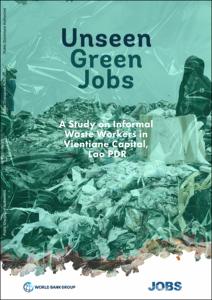As Vientiane Capital, the heart of Lao PDR, continues to grow, so does the urgency of effective municipal solid waste management. The city’s waste management system is rapidly evolving, with various stakeholders striving to enhance waste collection, transportation, and disposal services. Among these key contributors are informal waste workers (IWWs), who play a crucial yet often overlooked role in waste recovery. Their efforts not only reduce the volume of waste reaching landfills—thereby extending landfill lifespan—but also support the transition toward a circular economy.
Beyond their environmental contributions, IWWs help bridge critical gaps in financial investment, infrastructure, and human resources that local governments face in managing waste effectively. Recognizing the significance of their role, the World Bank conducted this study to build a comprehensive knowledge base on IWWs in Vientiane Capital. The research aims to assess their working conditions, livelihoods, and recycling practices, providing insights into their ecosystem.
By examining five key categories of IWWs—Informal Street Waste Pickers (ISWPs), waste pickers at the KM32 landfill site (WP32s), waste collectors, waste truck drivers, and junk shop operators—this study sheds light on their challenges, contributions, and opportunities for integration into a more sustainable waste management system. The findings and recommendations presented here are designed to inform evidence-based policies and investments that support both municipal solid waste management and the social protection of IWWs in Lao PDR.


